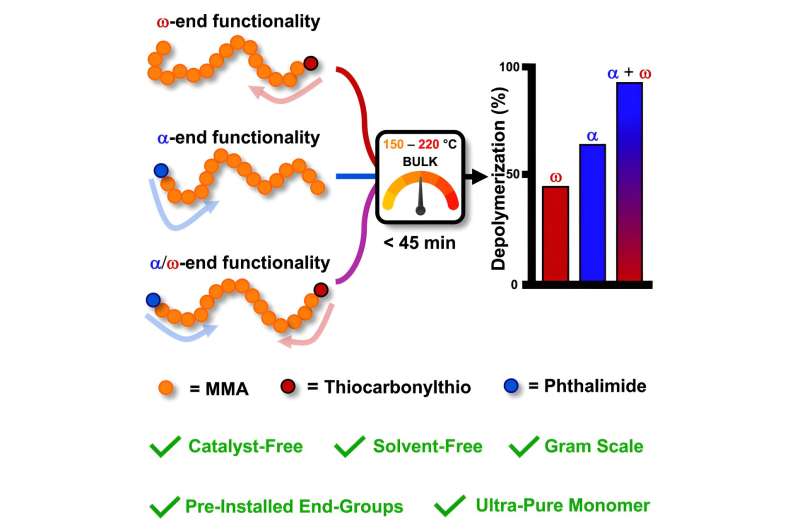This article has been reviewed according to Science X's editorial process and policies. Editors have highlighted the following attributes while ensuring the content's credibility:
fact-checked
peer-reviewed publication
trusted source
proofread
Breakthrough polymer research promises to revolutionize recycling

A team of researchers led by Brent Sumerlin, the George B. Butler Professor in the University of Florida Department of Chemistry, has made a breakthrough with the potential to transform how we recycle plastics. Their innovative approach to working with polymers has led them to develop a new method for recycling that promises to lower the energy requirement without sacrificing the quality of the plastic.
It's no secret that the U.S. and the Earth at large have a pressing plastic problem. Despite a meteoric rise in usage over the past few decades, only about 10% of our plastic currently ends up getting recycled.
"Our work is a response to the call to action proposed by the United Nations' Sustainable Development Goals," said Sumerlin. "New recycling strategies have become imperative to reduce the negative impact of plastic on the environment."
The plastic recycling process typically involves three key stages: collection, sorting, and reprocessing. Collection of consumer waste relies on individuals placing recyclables into designated bins, which are later picked up by recycling collectors. Subsequently, sorting takes place at recycling plants, where workers organize the collected plastics to sift away the non-plastic materials and group similar plastics together for reprocessing.
Sumerlin's team targeted the problems often encountered in the final reprocessing stage, where the sorted plastics are typically broken down into smaller pieces before being melted together and molded to create new products. This approach often produces lower-quality recycled plastic, as the polymer molecules that comprise these plastics are broken down into shorter segments.
Instead of this industry-standard thermal reprocessing, Sumerlin's team explored a different approach called chemical recycling. Their experimental yet promising strategy induces depolymerization of the polymers so that they revert completely back to the much smaller monomer molecules from which they were originally made. The resulting monomer can then be used to prepare new polymers with similar or better properties than the plastics from which they were derived.
While this approach has already proven to be industrially feasible, Sumerlin's team of graduate students developed a completely new method that dramatically lowers the energy required to achieve depolymerization. This experimental work was carried out by a team of researchers in Sumerlin's group and was led by graduate students James Young and Rhys Hughes.
"Not only does this allow recycling of plastics with less energy, but it also enables access to plastics of even better quality," said Sumerlin.
Polymer research at UF has continued to receive significant attention in recent years. Sumerlin and colleague Austin Evans plan to propel their research in this field. These groundbreaking discoveries may be just the first steps toward unlocking the full potential of polymers. For now, thanks to the efforts of Sumerlin and his team, the future of recycling is ablaze with possibilities, promising a greener and more sustainable tomorrow.
More information: James B. Young et al, Bulk depolymerization of poly(methyl methacrylate) via chain-end initiation for catalyst-free reversion to monomer, Chem (2023). DOI: 10.1016/j.chempr.2023.07.004
Journal information: Chem
Provided by University of Florida





















